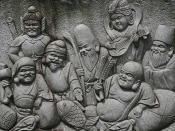Hume, Voltaire and the Problem of Evil
The presence of evil and suffering in the world has raised questions in the philosophy of religion for centuries. The traditional understanding, held by Christians since it was fully developed by Augustine, is that of original sin. The belief is that man is born evil, as a result of the transgression of Adam and Eve in the Garden of Eden. At the moment of sin evil entered the world, and it is now a hereditary, intrinsic characteristic of humankind. Because man is born guilty, any suffering he may undergo is justified; salvation is achieved only through divine grace.
The predetermined nature of this theology, along with its abstruse logic, compelled the thinkers of the Enlightenment to discard such a belief. Because they rejected Augustine's view, they needed a new system to help them understand evil and its place in the world. Voltaire and David Hume each address this issue in Candide and Dialogues on Natural Religion, respectively.
Voltaire does so in a more lighthearted approach typical of the philosophes, employing his wit to address weighty issues of philosophy and at the same time entertaining his readers. Candide makes this point with an amusing story and its brutal satire; Hume does so in a more pedagogical style. However, the Dialogues do employ a sort of plot that helps to draw the reader into the arguments and involve them in the characters' battle for truth, which makes it a more enjoyable read than the average treatise on philosophy.
Much of Voltaire's work is dedicated to attacking the theories of G. W. Leibniz, chiefly Leibniz's "principle of sufficient reason." Part of his claim is that since God is rational, everything he does has its foundation in reason. Nothing in this world happens by chance, rather...



Nicely done
I've really like this paper. it was written so well and the argumentation was apppropriate. some really good arguments were presented and they were all well supported. overall i really liked this paper. please keep on writing more and post it
0 out of 0 people found this comment useful.